Grace A. Johnson's Blog: Of Blades & Thorns, page 45
February 14, 2021
The Author of Love
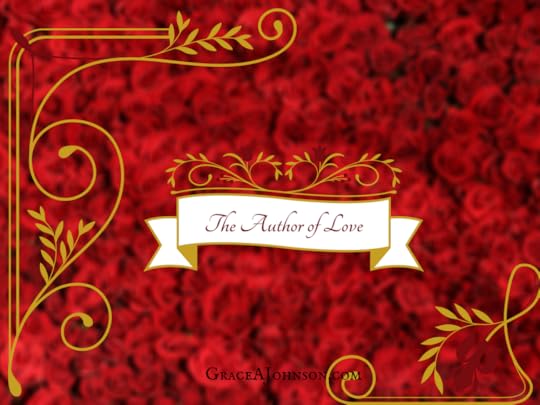
One thing that amuses me the most, I think, about being a romance writer is how we are defined—and how I define myself. All writers are known for putting their characters through hellish nightmares that are both disturbing and painfully realistic. Romance writers are no exception, but, by accepting that title, they make one promise: the promise of a happily ever after. To achieve such, they themselves, even as authors, go through a heartrending journey as they craft their characters and a perfect romance—and, along the way, they fall in love.
To be frank, romance writers fall head over heels for a character, allow their life to be tremendously ruined (perhaps several times over), and then give them a glorious happy ending.
I should know. I am one.
What struck me a couple months ago is that not only does that description define a romance writer to a T, it also describes God.
How? you ask. Well, I’ll put it in numbered points for you, since I’m trying to contain the stream-of-consciousness.
#1 Romance writers (RW for short) come to know and love their characters as much as if they were real people. We develop relationships with them (I know this sounds crazy...humor me for a second), we’re constantly learning about every nuance of their personality and facet of their lives, and sometimes we even talk to them (usually in the form of yelling at them to do what we forced, er, asked them to do). They become as much a part of our lives as if we were blood relatives, like a mother to her child.
How is that possible without being creepy? Well, we have to create a person from scratch—out of words rather than dust. We have to fashion for them a lineage, a genetic code, and a past that affects every aspect of their life and their story. We have to develop a philosophy (which is usually separate, if not the complete opposite of ours) for them to live by, a psychology that determines their reactions, and a theology that eventually morphs into faith. We have to walk where they walk, see what they see, and feel what they feel—and then we write it all down, like a child in a diary.
Once we’ve created a written character, we breathe our life into them. Maybe it’s a struggle we’ve dealt with, a question we wanted an answer to, a life we wanted to live, or a person we wanted to fall in love with. Maybe it’s our opinions, our dreams, our goals—or the total opposite, like our greatest fears and worst nightmares and crippling doubts. Like when God made Adam, gave him a spirit, and breathed him to life, we put a finishing touch on our creature and bind them forever to our souls.
Then they begin to walk...and they walk right into our hearts.
Likewise, God determined before the foundation of the world our DNA, our personality, our appearance, our past and our future. Then He breathed us to life, giving us a spirit and free will.
What’s funny to me is that oftentimes people believe authors have total control over their creation—be it their characters or their plot. We don’t. At least, the really good, devoted, character-driven ones don’t. Things don’t always go our way because, as we learn more about our characters and our world, we realize it wants to go or do something else.
Sometimes they end up wrecking our perfectly-planned story.
But, you know what? We love them anyway.
See the parallel?
#2 RW aren’t afraid to get gritty. At least, most of us aren’t. Even the sweet romance writers whose stories are happy and fairytale, Disney material don’t forget a dose of reality here and there.
People die. Characters are broken and abused. Their dreams are smashed. Their hopes are dashed. Sometimes, they’re physically harmed. Sometimes, they come to such a broken place in their soul and spirit that they almost can’t make it to turn the next page…
And we put them through these things. It’s called refining (or trial) by fire.
Our characters (ourselves) only grow stronger in adversity. The death of their sister makes them more loyal and sacrificial. The death of their father leads them to the arms of Christ. Years of living in sin draws them closer to God (and it also makes them more relatable to readers). Depression and anxiety and fear work in their (and our) favor as every chip and every knock against them is only smoothing out and perfecting the sculpture.
In the end? Well, we haven’t made it to the end yet.
The journey is rough, yes, just like real life.
Of course, God does not bring harm or calamity upon us, but, like with Job, He allows us to endure hardships, the consequences of our sin, and the effect of the fallen world we live in to make us stronger. He watches us grow in faith as we refuse to curse Him and instead give Him praise. He shows His amazing glory as we remain steadfast in our love for Him.
And...do you know what happened at the end of Job?
Happily ever after.
#3 The Author of Love promises us an eternity spent with Him, if only we believe. He promises us a happily ever after—sometimes even while we’re still living on earth. We are rewarded for our faithfulness, compensated for our sacrifice, glorified for our unwavering love.
We get a happily ever after.
You can’t say the same for the villain of the story, but if he gets his life right, the author (and the Author) might just feel pity for him and give him a reward or two. (In novels, that usually means we let him live to fight another day, or give him a chance to accept Christ before he dies. No, seriously. I did that with one character because, man, he stole my heart! And I just couldn’t live knowing he went to Hell…) In reality, if we—even the worst of us—accepts Christ’s gift of grace, we will get a happily ever after, and it’ll be so good that the readers will cry!
Authors love all their characters. We made them, after all. They don’t all turn out to be heroes or protagonists or even main characters. Sometimes they’re villains and sometimes they just fade into the background.
But we made them. We love them. We poured our heart and souls into them. And we are certainly jealous for them. Don’t say nothin’ bad ‘bout my babies, ya hear?
We let them go through some awful junk—why? Because what doesn’t kill you makes you stronger.
And in the end? The Prince will come, riding on His white steed and brandishing a sword of lightning, rescuing us from the dominion of darkness and establishing us in His Kingdom of light!
Just remember that this Valentine’s Day, someone’s asked you to be His. You may be like me—only fifteen and a hermit—and have no one to send you flowers or chocolates. You may be missing your valentine, a loved one who has passed on. You may be struggling with your relationship and uncertain if you even want a valentine.
But, you know what? There is Someone, every single Valentine’s Day and every single day of your life. He won’t stop sending you letters. He won’t stop calling your name. He won’t stop gazing at you with eyes overflowing with love. The very Author of Love—Love Himself—wants you to know that He loves you. He wants to you accept His love more than anything else.
Just like a romance writer, all He asks is that you read His book as He writes the greatest love story of all time—in your own life.
February 11, 2021
You HAVE to Check This Out!

So, I want y'all to meet my friend! Her name is Emily K. Seaver, and, y'all, this girl is mighty talented! I have a lot of goodies to share in this post, but that's not all! Emily will be back with a guest post this month!
Without further ado, meet Emily!


If you’re ever looking for E. K. Seaver, you can probably find her hiding in her room with chocolate while pounding away at her computer, penning her next novel or poem and belting off-key Broadway songs. She loves her King and strives to honor him. In her younger years she refused to settle on one creative outlet, bouncing from knitting to drawing to making movies with her family members and more. But once she found writing she knew where all the crazy ideas stored up in her brain could finally come out: on the page. She’s written as long as she could hold a crayon, and told stories even before that. However, when she turned twelve and began her first novella, she learned that stories were so much more than just something to do for pleasure, but they can also honor her Creator.
She strives for her stories to hold a meaning behind the tale, and attempts to follow in the footsteps of some of her favorite authors. She is in the process of editing the first book in The Reflections Trilogy.

I actually had the pleasure of beta-reading the first book in her trilogy, so take it from me when I say this girl can write! But that's not all! She's also an amazing designer! You can check out her beautiful designs here! (If you don't want to follow the link--I know how you feel--keep reading to take a peek at just a few designs!)




Now, for the good stuff! Em has just started up an email newsletter, and y'all have the chance to be some of the first subscribers! She has special sneak-peeks and perks just for her newsletter subscribers, and--guess what! (This is the best part!) Once she hits 100 subscribers, she's gonna start toward publishing!!!! Eek!!! Can you feel the excitement, guys??? It's contagious!!!
(Yes, I'm being much perkier than usual!!!)
Anyway...I also suggest you check out her blog, where she's posting everyday for the next 12 days, I believe (one month straight of daily blogging), and where you can check out her serial! Here's the first installment! She's also shared some fantastic aesthetics for her books that are just...ugh...
You can also find her on Pinterest, Goodreads, her other blog, and Instagram under @growingintofriends!
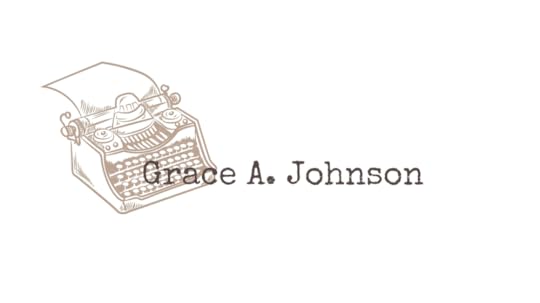
February 9, 2021
Guest Post: Historical Romance Heroes Have Become Boring by Kellyn Roth
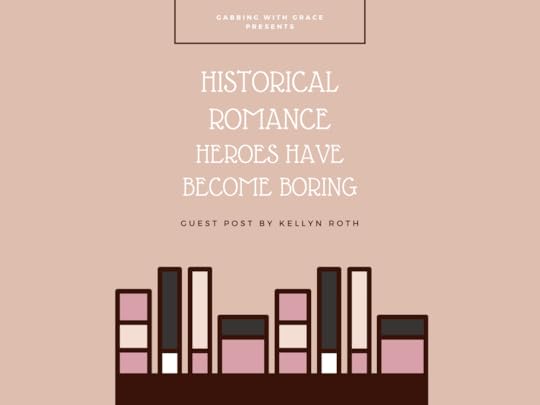
Y'all, Kellyn Roth is quickly becoming one of my favorite historical authors! Not only is she super sweet, she's also an amazing author! I'm currently reading The Dressmaker's Secret, and my review will be coming soon! In the meantime, I hope you'll check out my interview with her!
Kell also has some fantastic opinions! I really enjoyed reading her post on mistakes indie authors make (and I wish I had read that one much sooner!), and I LOVED her posts on historical heroines and feminism in historical fiction. So, when I was presented with the opportunity to have her do a guest post on my blog, I was torn! Since I adored her historical fiction posts, I knew I wanted to hear more of her opinions--and I knew I wanted to share them with y'all! Needless to say, this girl is a genius, and I have no doubt that she will revolutionize the historical romance genre!
After this post, I hope to share some more guest posts by historical romance authors so that you--both writers and readers--can learn more about the nuances of the genre.
Kell will be kicking us off with her examination of historical romance heroes (one of my favorite things!)! Y'all be sure to add your thoughts to the discussion in the comments! As writers, both Kell and I value our readers' opinions (that, and I want to make sure my heroes aren't boring too)!
____________________
Hello folks! I’m Kellyn Roth, author of The Chronicles of Alice and Ivy. Your dearest blogger allowed me to pop on here (thank you!) and share some opinions.
I was given a little freedom to talk about what I wanted to talk about, and if you know me, well, you know I like to rant about historical romance because, let’s be honest—though I love the genre, sometimes it can be a bit silly.
In the past, I’ve talked about how ridiculous historical romance heroines are, and how feminism in modern historical romances can get way out of hand …
Okay, why not talk about the menfolk?
Let’s start with a simple hypothesis:
Historical romance heroes have become boring.
Now let’s rip said statement apart, shall we?
First, let me say this: I have a lot more beef with historical heroes than historical heroines. Historical heroines have a thousand issues, but historical heroes tend to have one big one:
They are nothing but wishful thinking on the author’s part for the reader’s sake.
Frustrating as that is, it’s not their fault. Historical romance authors don’t seem to know any better—most of them are women, after all—and historical romance readers go as far as to encourage such sloppiness.
However, more so than even their personality-ridden, perfection-driven identity, they have become boring. Scripted. There to do the right thing at the right time, predictably, and to only make mistakes that drive the plot forward.
And I’m sick of it because men deserve better!
Look, folks. Even if historical romance heroines have gotten increasingly irritating over the years with the rise of false feminism, historical inaccuracies, and Offended Woman Trope, at least they have (obnoxious) personalities.
But the men are just there. They exist for the sake of giving the woman someone to play off of. Often they do the same predictable things, are not allowed to be anything more than repentant (without punishment) when the woman is unreasonable, and do the right thing at the end.
Now, don’t get me wrong: there have been a lot of terrible romance hero tropes!
This one is probably not the worst, in fact. After all, we had that Knight in Shining Armor faze—and then we had several different eras where slightly but not entirely abusive men were romantic (from Jane Eyre to Twilight—although one of those is an enduring classic while the other is sparkly, melodramatic boredom).
There was also bizarre era at the end of the 1800s-the early 1900s where men existed to worship women. (Helllloooo, romanticism! Welcome to the gang.) When I talk about this, I’m referring to just about anything by Gene Stratton Porter and novels like Anne of Green Gables (and its resulting series) and Pollyanna (more specifically its sequel).
At any rate, suffice to say, there have been tropes. There have been some horrible heroes in said tropes … and some sub-parr ones … and some great ones!
But now we’re being boring?
In my opinion, most heroes in historical romance have entered a stage of boringness that seems to have been popping up more and more in today’s romances, or at the very least, today’s historical romances.
This is not to say all—I know dozens of amazing books in this genre, after all, and most of the books I count as “amazing” have complex heroes!
Why is this? Usually there’s a cause for the stages of romance tropes, whether it be late Victorian romanticism or the suffragette movement.
My thought is that just now, historical romance authors aren’t wanting to step on any toes.
They want to move away from some of the aggressive bad boys with borderline abusive tendencies—but neither do they want to write characters that are perceived as underwhelming.
So they go for a middle ground and right the same supportive stock character who defies history with his near-pushover supportiveness and basically is The Perfect Man but sterilized, stripped of any true personality.
And therefore, in my opinion at least, not at all the perfect man.
Now, a part of it may also be laziness. Not all authors are going to spend a ton of time working on developing characters when readers don’t really care. However, I think part of it is a trend, too.
We punish men in our historical fiction a lot quicker than we do women. This used to be somewhat of the opposite—but now I think it’s come full circle and the female heroines get a lot less critique than the male ones.
Therefore, authors are playing it safe … and their safe-playing heroes, who lack much into terms of uniqueness, are boring.
Now, this is just my opinion as a female author who believes firmly in writing complex characters of both genders. However, I’m interested to hear your thoughts—do you think men are becoming boring in historical romances?
February 7, 2021
The Days We Are In
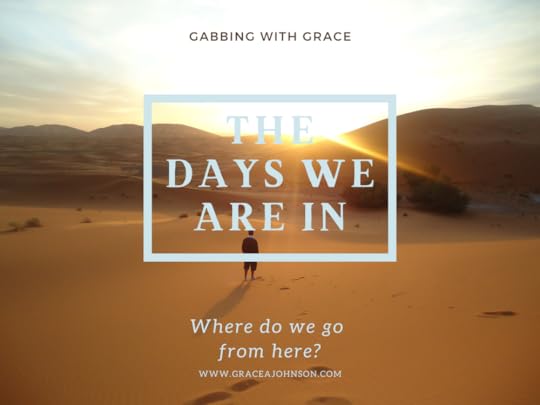
One of my favorite hymns is probably one you’ve sung, or at least heard, many times before. It goes a little something like this:
These are the days of Elijah,Declaring the word of the Lord:And these are the days of Your servant Moses,Righteousness being restored.And though these are days of great trial,Of famine and darkness and sword,Still, we are the voice in the desert crying'Prepare ye the way of the Lord!'Behold He comes riding on the clouds,Shining like the sun at the trumpet call;Lift your voice, it's the year of jubilee,And out of Zion's hill salvation comes.
These are the days of Ezekiel,The dry bones becoming as flesh;And these are the days of Your servant David,Rebuilding a temple of praise.These are the days of the harvest,The fields are as white in Your world,And we are the laborers in Your vineyard,Declaring the word of the Lord!There's no God like Jehovah.There's no God like Jehovah!

Oftentimes we put this song (not to mention the scripture and Bible stories from which is it derived) into a box, constraining it to the context described—famine, sword, and the quite literal days of Elijah.
We know that Elijah has long since ascended to Heaven, and no small number of the modern-day church believes that the anointing of Elijah—prophesy, miracles, and signs and wonders—has also faded, and because of this, we are left with little hope. We are no longer in days of famine (remember, we have grocery stores) or sword (guns, yes; swords, no—but the definition of this term would be persecution by means of death, which the Western church certainly does not experience), and therefore we are not in the days of Elijah.
Nevertheless, our time looks bleak. The church (and I mean the Body of Christ; not the building, mind you) is left wondering where we fit into this picture, what period we are in. Are we nearing the end? If so, what are we to do? Are we rather at the beginning of a longer journey? If so, what should we expect on the road ahead?
No man, nor Jesus Himself, knows the day or the hour of His coming, so I’ve little consolation for you on that part, but I truly believe that we have yet to approach the fullness time, when all shall be accomplished.
But there is no doubt that it is coming. Christ is coming.
And so we are left lodged in the middle, stuck in limbo. Shaken by the darkness of our past, but still patiently awaiting the future greatness.
Even my mother has asked me, what now? Where do we go from here? How do we—the Remnant—play into the grand scheme of things? The move of God we are praying for is just that—a move of God. As we await His working and not our own, what are we to do? What days are these?
These are days of disease (COVID-19), deception (concerning not just the election but most everything in our lives and country in this time), and darkness (y’all know where that comes from). In such a time as this, an Elijah must arise.
These are the days of servants like Elijah, one who will declare the word of the Lord. These are the days of leaders like Moses, restoring righteousness to the captives. These are days of David and Ezekiel, doing the will of God. These are the days of voices, like John the Baptist’s, crying out in the wilderness, “Prepare ye the way of the Lord!”
Behold, He is coming—swiftly and with justice grasped firmly in His right hand—and, behold, as we watch His mighty will come to pass, we shall see mountains crumple, empires fall, and new kingdoms erected for His glory. As He moves, we cry out in a wilderness of blinded eyes, deceived minds, and thirsty souls, that our God saves!
The Third Great Awakening is coming, O people of God! And He is calling us to rise up and proclaim His victory, His salvation, and His almighty name!
We are at Mount Carmel with the prophets of Baal, awaiting God’s holy fire. And as we wait and pray for His providence, we cry out to an unbelieving people, “Our God reigns! Our God saves! Our God, Jehovah, Yahweh, Jesus Christ, the Lord Almighty, is the One True God who holds all of Heaven and Earth in His hands! Prepare ye the way of the Lord, for He is coming, riding on the clouds, shining like the sun, at the call of our trumpets as we herald the harvest. He will not come until we are prepared! Make haste and call up His army! Raise up a new generation who prophesy in His name, who dream dreams, who command mountains to move and storms to cease! Awaken the Kingdom!”
Elijah may now be in Heaven. Jezebel may have long since passed. But these indeed are the days of Elijah, the great prophet; Moses, the faithful leader; and John the Baptist, the voice in the wilderness. These are great and mighty days, America! These are days of glory, all tribes, tongues, and nations of Earth! We still wrestle with the very same principalities and powers Elijah did—and we again shall triumph over the forces of darkness and declare victory for the Kingdom of God!
Our job in these times is to pray for the great harvest of a billion souls (yes, a billion, the Father says) and to call out to the army of the Kingdom! Awaken their souls, O God! Open their eyes to see Your glory cast upon their faces! Reclaim this nation—this world—for You, Father!
Behold, a Kingdom arises, one whose might is unknown by man and who power is uncharted by the past. Behold, a Great King is coming to reclaim His throne upon the Earth—but only when His Kingdom is ready! Prepare the way for His coming! Set this world on fire for Christ!

February 5, 2021
Guest Post: "Anna" by Abigail Metgzer

I'm so excited to share with you guys this fantastic post by my friend Abigail! Y'all know I love names, so having her share her thoughts and research on one very dear to my heart is sure to be a ton of fun! I hope y'all enjoy this post as much as I did!
_____________________
Anna. The name I once took for granted, had come back to me with a case.
You see, it was a quiet winter’s morning when it confronted me, holding an official briefcase (the kind that a lawyer would carry) and told me how absurd it was that I had overlooked it. And it went on to list all its facts and reasons why I was wrong.
And after reviewing the case, I agreed. Thence, I managed to settle out of court.
But as I kept my promise, I realized what a fun and intriguing a name it truly was.
Anna.
Simple and classic, with a flash of style.
The name Anna is of course a feminine name of Hebrew origin that means ‘grace’ and is a Latin form of the Greek name ‘Avva’.
While Anna and Hannah are the most common forms of the name, other popular variants include Anne, Ana, Anya, Anika, Annie, Annalise, and Nancy.
The name Anna had become more dominant over the simplified: Ann or Anne, because of its unique touch of style.
Though the name Ann/Anne is a good name itself, has been used around the world and possessed by many well-knowns such as Anne Frank for centuries, the name Anna has also been very widespread.
It has been reportedly used in England, Ireland, Australia, Poland, and Russia to name a few.
Speaking of which, ‘Anna’ was serially used by Leo Tolstoy in his great Russian novels, War and Peace and Anna Karenina.
The name was later given a fresh perspective as it became the name for the fiery Princess of Arrendelle in Disney Studio’s ‘Frozen’ and ‘Frozen 2’.
But of course, my favorite reference of the name ‘Anna’ is in the Bible.
“And there was a prophetess, Anna” (Luke 2:36, ESV).
Anna was a prophetess in the Bible and was connected with Jesus’ childhood, where she encounters Him in the temple.
Anna was also one of the few women in the Bible to bear the title ‘prophetess’ and upon reading her story, she certainly lived up to her name’s meaning.
“She never left the temple but worshiped night and day, fasting and praying” (Luke 2:37)
...Well, Name Lawyer or whoever you are that disrupted my list of exotic names to convince me to learn the history behind this one….... Thanks.
Anna.
What a name.
February 4, 2021
Review: Rough Way to the High Way by Kelly Mack McCoy
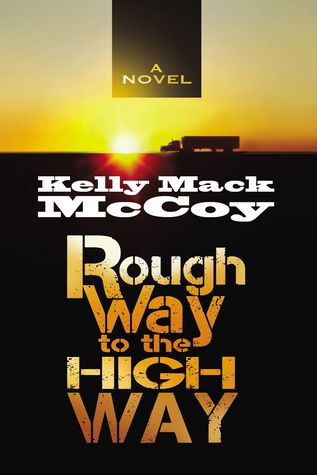
Pastor turned long-haul trucker, Mack, struggles with grief and perceived failures as a minister while he is confronted with a mysterious hitchhiker, smugglers, and a determined killer. A journey that began as a search for solitude and windshield therapy after his wife Georgia's murder becomes a high stakes adventure as a Texas Ranger and high ranking FBI agent seek to track down her killer.
________________________
*Warnings*
#1 This is a long review, so pull up a chair and grab a bowl of popcorn. You'll be here awhile. #2 When I read a review, I want substantial information. So I will not skimp on the details. Which will mean some spoilers, so watch out.
First Thoughts
I was pleasantly surprised, once I scrolled onto the first page of Kelly Mack McCoy’s debut novel, to find it well-written, edited, and formatted. (Once I researched Elm Hill, I was again surprised to learn about HarperCollins’ independent-publishing imprint!) Don’t be fooled—this is not your average indie book, debut novel, or mystery.
I wasn’t quite sure in the beginning where the mystery, danger, or excitement was coming in. Like other readers, I felt a lag—but the story began to pick up as I met new characters, learned more about Mack (our preacher-trucker-detective protagonist), and sensed the encroaching danger.
The Plot
The overall plot of Rough Way to the High Way is a little...undefinable. There’s no perceivable beginning, middle, or end—it’s one event after the other along the road to Chicago. This is both an escapist thriller and the spiritual journey of our hero Mack, as he struggles with grief over his wife’s death (which he believes was actually murder) and his lack of purpose now that he’s quit the ministry.
For readers who like a strong, well thought-out, defined book with a step-by-step plot, this book isn’t for you. It’s a little too close to our protagonist, a little too unexpected, and a little too much fun!
In some ways, I think having a stronger plot (with all the proper incidents and climaxes) might have been preferred. It would have given the story a backbone and made things flow better than being figuratively smacked in in the face by new happenings. In other ways, however, I can how see the escapism (which I mean in a nice way, y’all) and the wild road we travel with Mack makes the story better and more intriguing.
The Characters
We don’t really get to know anyone as well as Mack. The secondary characters—Barb, Ricky, Ben, etc.—stay a respectable arm’s length away from our protagonist. That allows us to grow with Mack and feel for him, even if the story’s written in a limited third-person perspective.
As for Mack, he’s got the tough, kind of sarcastic demeanor we associate with truckers, but his faith in God gives him a relatable, approachable air. We don’t ever get fully into his perspective (which I missed...first-person POV might have made the story even richer), but we get to know him like we would the fun uncle who always gives us candy and plays catch with the boys.
His story, faith, and journey are so relatable! I honestly feel like the author pulled from not only his own experiences with trucking but also from life lessons and his relationship with God. Mack had his faults (such as being a little gullible), but he had a lot going for him, which made him a lovable protagonist.
The Subject
Well, suffice it to say I learned a lot about trucking! That aspect of the novel was executed perfectly, of course. Everything felt so real (maybe a little 1980s-’90s, but those decades just fit the aura much better, if you know what I mean!), but I will admit that the other stuff was a bit lacking.
I feel like McCoy was trying to do a wee bit too much. I mean, terrorists tied to his wife’s murder? Government cover-ups? I don’t know. The big-city crimes didn’t jive with the small town trucking aura. Of course, once you tie in the supernatural elements, you’re left with either the whole spice cabinet in your gumbo or a really flavorful soup—it all depends on your perspective. For some, I think the combination would work. For me, I would have liked either or—a slow mystery on the dusty highway out of Texas or a thrilling battle between the government and terrorists.
Either way, he tied everything together, left no loose ends, and created a convincing mystery—one that was full of twists and turns! Even though Mack’s Heaven and Hell encounters kind of came out of nowhere, I think they were well-executed and played into Mack’s journey well. (And, of course, I love a well-executed encounter scene!)
The Prose
McCoy has a strong, straightforward prose. It’s even and stable, balanced between description and, well, non-description. I missed getting closer to Mack, missed the emotion, and missed hearing his voice. However, the author had a clean voice and polished prose.
And, just throwing this in for extra, I really liked his naming of the other characters—like Mr. Tire Man and Officer Pipe Cleaner. I’ve done the same before, so it’s great to see another author do so! And the cemetery/seminary confusion only serves to make Mack seem more real, and both things give him and the story more flavor!
Long Story Short…
I honestly was surprised by how good Rough Way to the High Way was. It had its low points, yes, but McCoy gave us a strong escapist story that thrills, excites, and inspires. Mack is a fun, relatable character, and his journey is one that speaks to us all (even if we weren’t involved in murders and schemes to take over the world)!
Disclaimer: I received a free copy of this book and payment for an honest review. All the opinions expressed above are my own.
________________________
Where to Find the Book
Rough Way to the High Way is available wherever books are sold--Barnes & Noble, Google Play, and Audible and Kindle Unlimited through Amazon!
________________________
About the Author
Kelly Mack McCoy traveled the highways most of his adult life gathering a lifetime of material for his books. He chose to pursue a life-long dream of becoming an author after a life-altering event changed the trajectory of his life. He teamed up with author John Floyd Mills, a former writer with the now defunct San Antonio Light Newspaper to write a series of novels about a pastor turned trucker who hits the road after his wife’s death. The two never wrote the novels due to quite different writing styles. John went on to write his second novel alone. Kelly Mack McCoy continued with the pastor turned trucker project on his own, but it took another life-changing event for him to be motivated to see the project through to completion. That event was the Death of John Floyd Mills. The completed project would become the highly acclaimed novel, Rough Way to the High Way.
February 2, 2021
VALENTINE'S DAY GIVEAWAY!

GUYS, GUYS, GUYS!
Y'all know I LOVE free stuff. I mean, I spend astronomical amounts of money at Bath & Body Works just so I can get one. thing. free. I've also entered so many giveaways that I couldn't keep count if I tried! (I can count, however, how many I've won. Zero.)
Anyway, Valentine's Day is right around the corner, so I thought--very short-term, I'm now realizing--"Why don't I do a giveaway?"
Well, I hem-hawed about what to actually give away, before I finally decided...
I'mma let y'all choose!
First things first, lemme give you the rules...
#1 The giveaway starts February 1st (as in, yesterday!) and ends noon (Eastern Standard Time) February 14th!
#2 Winners will be announced on February 14th--if you win, I'll send you an email containing your prize!
#3 ONLY ONE winner will be chosen. The rest of y'all can stick around for all of the fun goodies I send out in my newsletter each month and all the cool stuff goin' on my blog!
#4 All I need from you is your email address--no other information is required, and I'll not be exploiting your email in any form or fashion.
#5 Once you've entered, you'll be signed up for my monthly newsletter (if you aren't already). You can unsubscribe at anytime or enjoy monthly goodies until the next giveaway!
#6 I'll be sending the winner a copy in their preferred format--MOBI (for the Kindle app/devices), ePUB (for Adobe Digital Editions), or PDF (for your internet browser). Again, you get to choose!
#7 If you aren't sure you'd like to enter, that's fine! You can share with your friends and family or, better yet, you can enter and, if you win, send your copy to a friend for them to enjoy!
#8 Have a very happy Valentine's Day!
______________________
Want more giveaway goodies? Some of my fellow authors are hosting a super fun giveaway that you can enter right here!
Now, I know the sound of only one winner might be a wee bit disappointing, but guess what! Just for entering, you get a free short story! Plus, if you've reviewed any of my books (or if you want to), just let me know and I would LOVE to reward you with a short story of your choice! Happy Valentine's, guys!
February 1, 2021
Fantasy Writers' Worldbuilding Linkup
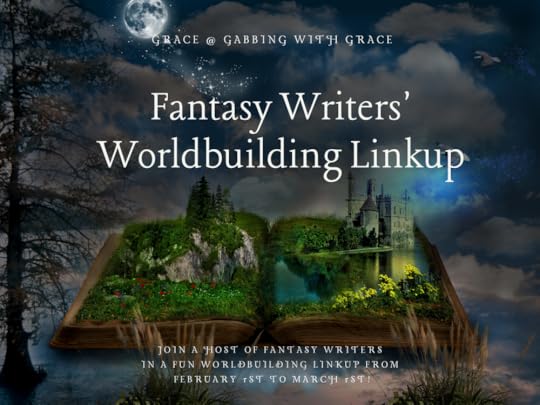
*clears throat and splays hand in a broad gesture* Welcome, one and all, to my first ever linkup (also my first ever fantasy-related anything...ha ha)! Before I jump into the details, I'd like to introduce myself (and my intentions). I've never hosted a linkup before, and this one will probably be a little different than the usual ones, but I'mma give it a go!
I'm typically a historical romance writer, although I grew up on fantasy and speculative fiction, so finding me in the realm of the LOTR fans and the fantastical writers with their pet dragons is a rarity. I've only ever been to a dragon show once before, and after getting a wee bit too close to having my eyebrows scorched, I haven't made it a habit to return. You understand.
Anyway...
There's this wonderful forum, you see, called Kingdom Pen, and a lovely friend of mine started a topic about a week ago called "Let's Build a World." Well, it got me thinking. I've been fiddling with quite a many fantasy stories within the last four years, but I'm far from an expert (which would be why I've only ever written a short story), and I'd like to expand my horizons and hone my skills (or, rather, develop my skills).
One of the best ways to do this is to practice worldbuilding. It is, after all, the make-it-or-break-it element of a fantasy novel.
I'd also like to host a linkup, so here we are! *grins cheekily*
Here's how it works, y'all:
Worlds (like earth, for example) are full of different regions, terrains, people, cultures, languages, creatures, mythologies, religions, etc., so you can never pick just one when creating your world (except for maybe the medieval Europe style world that everyone just loves). With this linkup, we'll all create just one element of a large world, then I'll share the links to everyone element (it can be any of the ones mentioned above) in the final post on March 1st. You can describe a place, write a story about a person, or even create a map of anything you like and post it on your blog or social media--just put the link to your post in the comments! You can use my graphic above, or you can create your own! (By the way, tying your element into your graphic is encouraged!) Share this linkup with your friends and fellow writers and on social media--better yet, you can share with artists of other mediums, like poets, designers, cartographers, etc.! Worlds exist on more than just paper, you know! The best way to spread the word is by including the link to this post in yours! The linkup runs from now (February 1st) to February 28th. I'll post y'all's links on March 1st. You are more than welcome to join in anytime after--you may not end up on the list, but if I see a lot of people have joined in after the end date, I may have a second post. In the final post, I'll share the links you give me. If you have any images you'd like me to share, I'd be more than happy to include them as well. I will also share my own creation in the final post!_________________________
I can't wait to see what y'all create! Let me know if you have any questions (or notice any problems), and otherwise just have fun!
January 29, 2021
Author Interview: Kellyn Roth
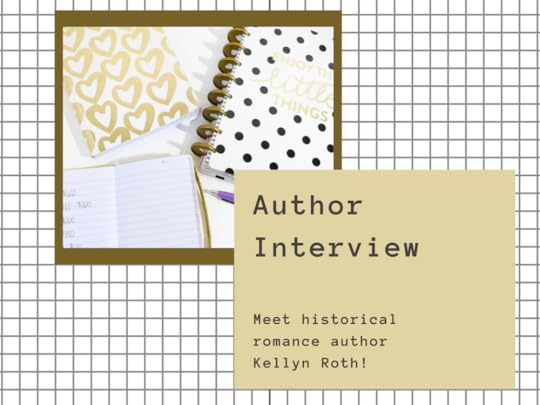
Guys, y'all know I LOVE author interviews. You also know I LOVE historical fiction. You should also know that I LOVE young Christian indie authors.
Therefore, I LOVED interviewing Kellyn Roth! She is just the coolest--a homeschool grad, indie author, and historical romance writer. What's not to love? You can learn all about Kell and her latest release, Becoming Miss Knight, here!
In addition to this super fun interview, I've also got a guest post by Kell and several reviews of her books coming soon! You can keep up-to-date on my reading progress by following me on Goodreads!
________________________

Kellyn Roth is a Christian historical women’s fiction & romance author from North-Eastern Oregon who has independently published multiple novels, the most notable being The Chronicles of Alice and Ivy series. You should definitely call her Kell.
Kell lives on family-owned property outside an unmemorable but historical town with her parents, two little brothers, arbitrary cat, precious border collies, a dozen cows, and lots of chickens. She also possesses a classic, vintage aesthetic which does not at all speak to her country girl side, but such is life.
When not writing, Kell likes to blog, teach writing to her various students, have day jobs which allow her to keep her car properly insured, and spend lavish amounts of money on Dairy Queen french fries. She also likes to talk about Keira Knightley and her own books just … way too much.
Check out Kell's awesome website and blog here!
________________________
GJ: What first inspired you to write? KR: I don't really know! I just always have wanted to. It came quite easily to me when I was small - I liked jotting down poems and little stories - and I'd just write down stories every so often as they came to me.
GJ: What are some of the driving forces behind you and your writing now?KR: Knowing that if I don't write, I've sure wasted a lot of time. ;-)
More seriously, though, I express myself best via writing - and not so well with my mouth or even non-verbally. So it's a way of getting my thoughts out, a kind of therapy, and an awesome work of craftsmanship that I can offer to God.
GJ: Can you name any authors who have inspired your voices in different ways? How can you see their influence in your writing?KR: For sure! I can think of any number. Gene Stratton Porter, Jane Austen, Kristi Ann Hunter, Sarah Sundin, and Julie Klassen are ones that come to mind.
I can see little things from each other - for instance, I got my sense for the absurd from Kristi Ann Hunter and my tendency to run-on sentences from Gene Stratton Porter.GJ: What are some of your most favorite books/genres—to read and to write?KR: I'm absolutely a historical fiction kind of girl! More specifically, I enjoy and write Christian historical women's fiction & romance. My favorite books tend to be either that genre - or classics.
GJ: What do you do when you aren’t writing? KR: I think about writing!
Other than that, I have a couple day jobs, watch a bit too much TV, play clarinet and saxophone, hang out with my friends, and obsess over border collies. I also like to read, but that feels like a different form of writing at this point!GJ: Looking back, what has changed for you as a writer—be it how you write or what you write about?KR: Well, everyone grows and matures over the year, but I think everything has been pretty subtle. My writing style has sort of shifted over the years as I've shifted, and growth is nothing if not slow.
I think I'm a lot less hesitant to take on tough topics than I used to be, and I've also really defined what I write and why!GJ: Out of all of your books, which one is your favorite? Why?
KR: I'm not really sure. I like them all! Right now, I'd say The Dressmaker's Secret, which is book 1, but I think At Her Fingertips (book 3) is sneaking up on me - once I finish the final draft, I'll probably like it as much.
TDS is sort of my baby, and it's the one I've put the most work into. I'm very proud of my work there! I'm also proud of At Her Fingertips because it's a bit of a different genre (historical romance instead of historical fiction), and I love writing romances.GJ: Your third installment in The Chronicles of Alice and Ivy, Becoming Miss Knight, is coming out on January 23rd! Could you tell us a little bit about the story behind the story?KR: Well, it's #2.5 in the series (being a novella) - and I realized I needed a 2.5!
Book 2 and book 3 are separated by several years, and I've had a number of people say they wanted to hear about Alice and Ivy's teen years or at least catch up with them before book 3 comes out.
So I decided to write the novella! It took me just a couple weeks, and then a month or so to get edits in. I'm quite pleased with the results - it's a perfect little in-between story for fans of the series.GJ: What was your writing process for your Alice and Ivy novels? Did you pants them? plot them? How long did each book take you to write?
KR: I plotted them all, after the very first draft of The Dressmaker's Secret.
Most of them took me a month to write. Rewrites then take me a couple months. However, it's a little difficult to gauge since most of them were written multiple times. (I'm so thankful I'm done with all those rewrites and back to just writing books again!)
GJ: You relaunched the first books in your series back in 2016 and 2017. How did you feel going back to your writing? Did much change in the updated versions?KR: It was really great, actually! I enjoyed the chance to strengthen my books and make them into something a bit more readable. The changes have been quite major - in both cases, I did huge rewrites, changing almost everything but the character names and the basic ideas - but it was well worth it!
GJ: What is your most favorite character in the series, and what endears them to you?
KR: He hasn't actually shown up in a published book yet, but Peter Strauss.
He's just about the sweetest guy in the world, and he's a main character in book 3 (At Her Fingertips), so I'm excited about that! He's so relatable, too - a bit fearful but determined, loves books, and obsesses over what people are thinking way too much. :-PGJ: Which part of Becoming Miss Knight was the easiest to write, and what was the hardest? Where did you stumble and second-guess yourself?
KR: It was overall pretty effortless. I found that in this book, unusually enough, the parts with Alice were a lot easier than the parts with Ivy. Ivy just wasn't talking to me for most of the book!
GJ: You have another series, Kees & Colliers, and a Regency romance in the works. Can you tell us a little bit of how they came about?
KR: Well, with the Kees & Colliers, I just wanted to write a book set in that era (it stretches from WWI to the end of WWII), and I had an idea for a rather prickly family situation. It all went from there! So lots of drama, lots of tough decisions, and lots of mistakes being made by the characters. I published it rather quickly, but I'm still glad I was able to share it with people!
The Regency romance, The Duke's Twin, is just a fun romance idea I had - what if twins switched places and then one of them happened to fall in love with a woman who now thinks he's his older brother? But it'll be a long time before that one is out.
GJ: What do you want, most of all, for readers to take away from your books?
KR: Well, I'm not really in control of that, so I try not to worry about it. But overall I want to share little truths with my readers here and there.
GJ: Have you ever endured any discouragement as an author? If so, what inspired you to persevere?KR: I definitely have! But knowing that writing is all about hard work made me more willing to persevere.
GJ: What are your greatest aspirations for your future, be it as a person or as a writer?
KR: I'm not really sure! I want to make the equivalent of a full-time, very well-paying job as an author, but that's more of a long haul goal. I try not to plan too far out as that makes me inflexible when God brings new things into my life.
GJ: What has being a writer taught you?
KR: A lot of different lessons! It's taught me to persevere when things are tough, to use my brain to solve tough problems, and to work hard and steady at one goal for a long period.
GJ: What are your thoughts for other aspiring writers on writing and publishing?
KR: My biggest tip would be to write and edit at least three full-length books in your genre before you even consider publishing. More than that would be ideal! Writers seldom write enough before they try to publish.
January 27, 2021
Review: Campus Menace by Preston Shires
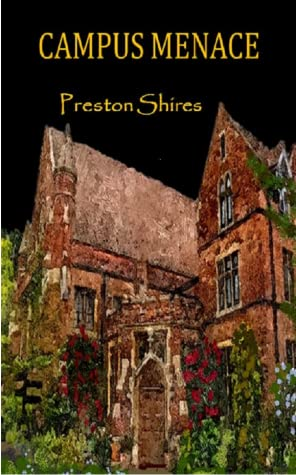
Tasia Everett, a beautiful co-ed, goes missing, and it’s increasingly clear there’s a murderer loose on campus, and somebody needs to find the culprit. What better team of detectives than Tristan Telsmith, a religion-mocking professor, and Cambria Davenport, his Bible-thumping student. In this ‘who done it’, the mystery comes first, but it’s equally entertaining to listen to the religious-minded Cambria trying to match wits with the atheistic professor...or is it the other way round?
____________________
*Warnings* #1 This is a long review, so pull up a chair and grab a bowl of popcorn. You'll be here awhile. #2 When I read a review, I want substantial information. So I will not skimp on the details. Which will mean some spoilers, so watch out.
First Thoughts
Foremost, one must applaud another’s good intentions, regardless of their outcome. Preston Shires set out to tackle a theological debate and an intriguing mystery in one book—and, to be honest, he accomplished both. He chose a college campus to prove the infallibility of Scripture and to write a disappearance mystery—a perfect setting, in my opinion.
I waded into Campus Menace on my tiptoes in my boots, uncertain what I would find. However, it became increasingly clear that Shires was onto something—literally. I eventually took my boot off and got sucked into Professor Telsmith and Cambia’s heated debates, even though it took some time for the mystery to appear.
The Plot
The plot was...different, to say the least. With a narrator taking the helm in an almost autobiographical account of the mysterious proceedings, there is no definable plot-line. Though Campus Menace is a mystery, it’s not until you’re more than halfway through the book that the mystery becomes manifest, so to speak. The prologue keeps us hanging onto hope, while several chapters are spent on backstory.
If you’re not interested in theological debate and you don’t like backstory on all of the professors and students and the regular illicit affairs of college life, then rest assured that all of it was completely necessary. The debates between Telsmith and Cambria were exciting and kept me cheering Cambria on and awaiting her next witty remark. Before long, I began to wonder where their debates and Telsmith’s strange proceedings (such as multiple attempts at breaking and entering) where leading me...until the “murderer” struck and a game was afoot.
Even though there’s a lot of uncertainty in the beginning and the middle of Campus Menace, Shires was adeptly setting the stage for a befuddling mystery and a Poirot-like reveal at the end.
The Characters
I’m torn between saying that the characters in Campus Menace are stereotyped and cliched and saying that they are unique and surprising. It is possible for them to be both?
To be honest, Tristan didn’t sound at all like a twenty-four-year-old. For the longest time, I had reckoned him to be between thirty and forty, since he sounded more like the author than a fresh-out-of-college-himself college adjunct. Once I discovered his age, I had to reconcile his first-person POV with the author’s own voice. It grew on him, even if he seemed stuck in limbo somewhere between American youth and Victorian-era Englishman.
As for Cambria, I quite liked her. She was smart and fiery, witty and smooth. Of course, in some ways it seemed that Shires had her (along with the other college students and faculty) stereotyped, but most of them panned out to be rather interesting—one Tasia Everett, the hapless victim, in general.
The other characters had flavor but lacked originality. Either that, or I’ve become jaded toward the culturally-progressive college setting.
Even if the secondary characters behaved exactly like college kids and wayward professors (which makes them all suspects, of course), our protagonist and his fundamentalist sidekick have unique views and personalities. Reading from Telsmith’s perspective turned everything on its head—from the mystery to the Bible to Cambria herself. Shires did a fantastic job portraying him and his agnostic views, but he still kept his story straight by help of Cambria, who worked to prove the truth and infallibility of Scripture to our dear Prof. Telsmith.
The Subject
Goodness knows that, apart from The Mysterious Affair at Styles, I haven’t read a proper mystery in at least six years. Of course, armed with mon ami Poirot, I was able to appreciate the story leading up to the mystery, the careful consideration involved (on the author’s part, not the perpetrator—had they considered their actions more carefully, they wouldn’t have been caught), and the grand finale.
It took a moment to get there, for the reader to be “Oh, here’s where the fun begins,” but Shires did an impeccable job of crafting his mystery—sneaking clues through heated arguments with Cambria and slipping red herrings past the meetings with the Miscreants. Before long, he had a firm foundation for the mystery to unfold. And unfold it did. It was a quick ordeal, but I think the pacing was beneficial. Should the reader be paying more attention to the mysterious happenings on campus than to the theological debates, then they might decipher just who the culprit was before our two amateur detectives.
And I have mentioned that Cambria Poirot and Tristan Hastings’s reveal at the end would have made Dame Agatha Christie proud.
On a theological note, Shires knows his business. After reading the author’s note at the end, I can see why. He, once in a place quite similar to Tristan Telsmith’s, was able to consummately and accurately present agnostic arguments and “facts” to refute the truth of the Holy Scriptures, such as any atheist would. But, now a Christian, he utilized Cambria’s never-back-down, Rocky Balboa attitude to combat his own arguments. I firmly believe in the infallibility of God’s Word, and, as an author, I know how fun and satisfying it is to write a book reflecting my personal views—sometimes in reply to another’s own opinions. Of course, not always does the mix of opinions and plot, beliefs and fiction turn out properly, but Shires chose a perfect way to do so. The last scene with Cambria and Tristan sums all of that up.
I do think Shires presented today’s culture a little...forcefully. Everyone being immoral and wayward—and blatantly so—hindered the character’s authenticity and the actual story. A representation of college life and culture could’ve been achieved much smoother and subtler.
The Prose
So, I’ve mentioned that Campus Menace is told from the first-person, autobiographical-style POV of Tristan Telsmith, college adjunct, atheist, amateur detective, and John Wayne, James Bond, and Midsomer Mysteries fan. Telsmith eventually admits that he has written down his firsthand account of the happenings on campus, and that his “detective’s diary,” so to speak, is what we read.
Because of this, the tense jumps around. Sometimes it’s past, sometimes it’s present. Until you come to the realization that Campus Menace is not written in the POV of Prof. Telsmith—it’s written by him—that’s kind of jarring. However, I appreciate Shires using only one POV and using him as the first-person narrator. Head-hopping or multiple POVs would have only taken away from the story.
That being said, Telsmith has a strange voice. It certainly doesn’t sound anything like that of a guy born in 1994—not the average one, at least. It’s quite obvious that Telsmith’s voice is the author’s rather than his own, so he’s very loquacious and difficult to take seriously at times. He’s not the most convincing character, and perhaps that is a good thing, because unconvincing characters make you think—about them, about their views and personality, about the story.
The narrator aside, Shires’ prose is mature and philosophical, full of dry humor and wit. It doesn’t fit his character, but it fits him and, in the end, it fit the story.
There were only a few typos and grammatical errors—two misspelled words that were forgivable (I deduced the cause of their unfortunate existence by examining the layout of my computer keys) and a few misplaced commas and semi-colons. That’s usually what you get when you go for the deep and wordy writing style. Otherwise, the manuscript itself was pretty clean, which is surprising, seeing as how it was edited by Shires’ thirteen-year-old granddaughter.
Long Story Short…
I can’t say Campus Menace was perfect, but it did surprise me. It took me a while to read, but I kept coming back to Cambria and Telsmith’s arguments and, once the mystery began to unfold, I couldn’t stop reading! There are a few mistakes, mostly concerning the authenticity of the characters and the depictions of certain elements, and at times there was a lull, but Shires pulled it off! I would recommend Campus Menace for adults, although it might fit in the New Adult genre, being set at college and all. From the theological and historical debates to the mystery, Shires kept to his good intentions by giving us an intriguing mystery and proving the infallibility of Scripture.
After Campus Menace, I’d like to see Tristan and Cambria solve another mystery—maybe something might come out of their strange partnership after all!
Disclaimer: I received a free copy of this book and payment for an honest review. All the opinions expressed above are my own.
____________________
Where to Find the Book
Campus Menace can be purchased on Amazon in both Kindle eBook and paperback format. It's also available on Kindle Unlimited!
____________________
About the Author
Preston Shires is a history instructor and lives on a farm with his wife, Sylvie, in southeast Nebraska. He spends his days reading, writing, teaching, or farming. Preston's book, Knight Time for Paris, was runner up at the Athanatos Writing Contest and was published by Athanatos Publishing. In Knight Time for Paris, France's medieval crusader king, Louis IX, comes to life in the 21st century with hopes of redeeming his kingdom. This work reflects Preston's interest in medieval and contemporary European history. However, he is also at home with American history and penned a novel of historical fiction set in the frontier river town of Brownville, Nebraska. The year is 1857 and Adeline Furlough, the main character, is going to make a name for herself in a most unusual way. Life in a Casket has been short-listed in the Laramie Award competition. Follow this story and others at prestonshires.com.



